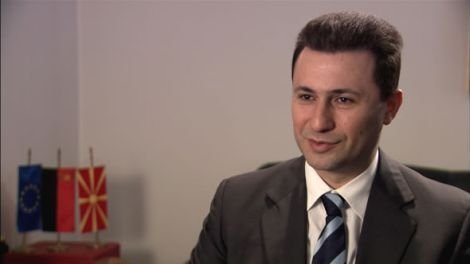
Macedonia gets new MPs
The ceremonial handing of MPs' certificates to Macedonia's newly elected representatives took place without the presence of opposition parties, which dispute the legitimacy of the April elections.
Newly elected opposition legislators did not appear on Wednesday at the State Electoral Commission, SEC, to receive their certificates to sit in the 123-member parliament.
Only 88 of the 123 representatives obtained their certificates - 61 from the main ruling VMRO DPMNE party of Prime Minister Nikola Gruevski and 19 from the junior ruling ethnic Albanian party, the Democratic Union for Integration, DUI.
The opposition Democratic Party of Albanians, DPA, which won seven seats, and the small GROM party, which won one seat, will be the only other parties participating in the new assembly.
The main opposition Social Democratic Party, SDPM, the New Social Democrats, NSDP, and the Liberal Democrats, LDP, which won 34 seats in total, all spurned their certificates. So did the small Albanian opposition party, National Democratic Rebirth, NDR.
These parties insist that April’s general and presidential elections were fraudulent and say a caretaker government should be formed to carry out fresh polls.
The constituent session of the new parliament is expected to take place on Friday. But judging by the opposition no-show on Wednesday, it will lack a quorum.
The session inaugurating Gjorge Ivanov as President of Macedonia - in the parallel presidential polls he won a second five-year term - is expected by Monday the latest.
However, parliament’s plenary hall might be even emptier for his inauguration. Apart from the expected absence of almost the entire opposition, the junior ruling DUI is also likely to boycott this event.
This party previously said it would not recognize Ivanov as President because of the way he was elected.
The DUI boycotted the presidential polls, having demanded the selection of a “consensual president” who would be elected in parliament following an agreement between the strongest parties in the Macedonian and Albanian blocs.
The European Commission spokesperson, Peter Stano, in an interview on Wednesday called on Macedonian leaders to resolve the issue on their own.
“I do not wish to speculate about possible interference from outside. I would rather wish to point out the need for constructive engagement and dialogue between the government and the opposition in the country”, Stano was cited by Faktor news portal as saying.
Stano said the Commission wished to “echo” the assessment of OSCE/ODIHR election monitors that the polls were well administered but overshadowed by systematic flaws.
The OSCE previously said the election failed to meet key standards concerning the separation of state and party activities, the existence of level playing field between the parties, neutrality of the media, accuracy of the electoral roll and the possibility of gaining redress through an effective complaints procedure.















